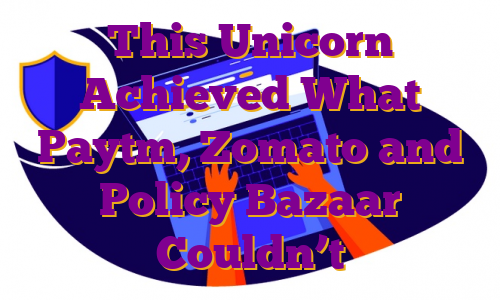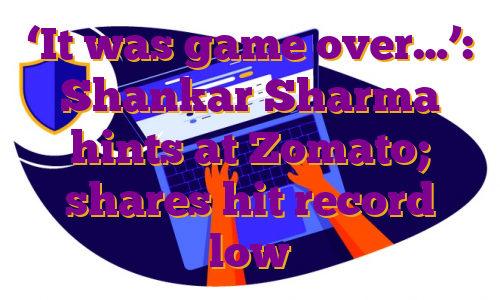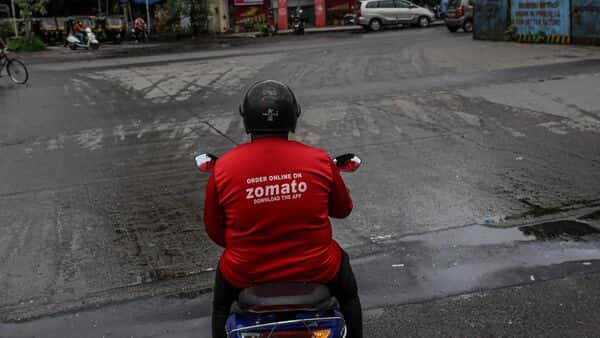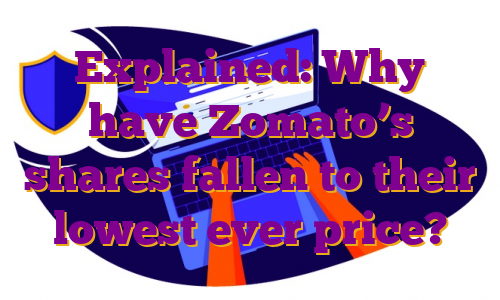With so much going for it, a blockbuster opening was certainly on the cards. Alas, that was not the case. The stock made a rather cold debut on the stock exchange. Despite the overwhelming subscription, it rose just 13.5% on the listing day, making it the worst debut of the time amongst stocks that were oversubscribed 100x or more. I hope you remember the famous dictum that time is the friend of a good business and the enemy of a bad one. While we are yet to decide whether the business is good or bad, the time was certainly a good friend of the investors who didn’t sell on the listing day and stayed put. Since its listing price of ₹212, the stock has almost doubled. Yes, you heard that right. Despite its poor listing, the stock has done exceedingly well. For perspective, Unicorns like Paytm, Zomato and Policy Bazaar have all crashed since their IPOs and caused huge wealth destruction. However, this stock has bucked the trend and how. It has left all the three, way behind. But wait. Why am I comparing this stock to start-up Unicorns like Paytm and Zomato and not to some other stocks? Well, simply because the stock that I am referring to, Easy Trip Planners, is also a startup Unicorn. And while it may not be as famous as the other high-profile names, it has certainly beaten its fancier counterparts when it comes to shareholder wealth creation. I think the main reason is that unlike stocks like PayTm and Zomato, Easy Trip Planners ticks both, the quantitative as well as the qualitative boxes. Hope you remember Ben Graham’s famous definition of an investment. An investment operation is one which upon thorough analysis, promises safety of principal and a satisfactory return. Operations not meeting these requirements are speculative. However, there’s another definition of investment that Graham has come up with but is not as famous as the first one. Here it is. An investment operation is one that can be justified on both qualitative and quantitative grounds. Now, what is qualitative and quantitative? Let us find out. Graham was of the view that an analysis of any stock or bond is of two types. Qualitative analysis and quantitative analysis. Quantitative analysis consists mainly of a study of the financial statements of the company. These are things like the debt-to-equity ratio, the earnings growth and the earnings power, dividend history, assets and liabilities and operating statistics like the return ratios and the profit margins and others. Qualitative analysis on the other hand, consists mainly of the nature of the business, its prospects mainly and the quality of the management. So, if I were to take some of the best companies in India say like Page Industries or Asian Paints or even Titan Industries for that matter, their historical growth rates, their return ratios, their margins will all come under the quantitative analysis.
However, their prospects, the quality of their management and their competitive advantages will all form a part of qualitative analysis. Now, the question is, which one of the two should you give more importance to? Qualitative analysis or quantitative analysis? Well, as Ben Graham’s second definition of investment suggests, an investor should not invest in a stock unless it satisfies both the quantitative as well as the qualitative criteria. And I think this is where Easy Trip Planners steals a march over its high-profile peers like PayTm, Zomato and Policy Bazaar. These three Unicorns may be ticking all the boxes when it comes to qualitative parameters. They might have great prospects and they may have a stellar management team at the helm. However, the quantitative aspect is where they have performed extremely poorly. None of these three Unicorns are profitable yet. They are still burning huge cash year after year and need constant infusion of funds. This is certainly not a great position to be in from a quantitative standpoint. Now, consider Easy Trip Planners from the same quantitative standpoint. The company has not had a single year of loss in the last 12 years, has managed to double its topline and grow its profits by 5x between FY17 and FY22 and has even started paying dividends FY21 onwards. Of course, not to forget an almost debt free balance sheet. Besides, if you go through the company’s website and try to get a feel of the management quality, you are likely to come away impressed. Here’s a paragraph that I liked in particular. We have not required any equity infusion subsequent to our original incorporation requirements, and we have historically financed our working capital requirements and the expansion of our business and operations primarily through funds generated from our operations and debt financing. Isn’t that praiseworthy? Other Unicorns like Zomato, PayTm and Policy Bazaaar may be growing their topline faster than Easy Trip Planners. However, if that growth is coming with an even bigger hole on the P&L statement, then it is of little use in my view. Contrast this with Easy Trip Planners where the management seems to have walked the talk when it comes to both managing the business as well as capital allocation. Little wonder, investors have rewarded the company with a significant growth in market valuation even as others have eroded the same. I think this is a good case study on the kind of Unicorns that one should look for. The approach shouldn’t be any different than how you assess other listed companies. The stock should tick both the qualitative as well as quantitative boxes rather than just selling a story of how the future is all roses and sunshine even as the past and the present are all dark and disappointing. Disclaimer: This article is for information purposes only. It is not a stock recommendation and should not be treated as such. This article is syndicated from Equitymaster.com
Catch all the Business News, Market News, Breaking News Events and Latest News Updates on Live Mint.
Download The Mint News App to get Daily Market Updates.
More
Less
Subscribe to Mint Newsletters * Enter a valid email * Thank you for subscribing to our newsletter.
Post your comment
.






